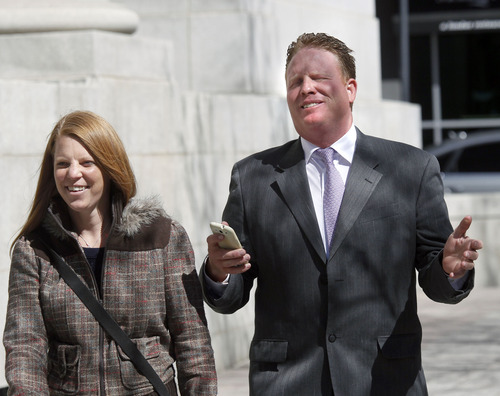This is an archived article that was published on sltrib.com in 2014, and information in the article may be outdated. It is provided only for personal research purposes and may not be reprinted.
Indicted businessman Jeremy Johnson told state investigators that he laundered tens of thousands of dollars in campaign contributions to Mike Lee's successful 2010 Senate bid at John Swallow's request — a flagrant violation of federal election law.
The bombshell is buried in a 41-page affidavit supporting a newly unsealed search warrant in the ongoing criminal investigation of Swallow, Utah's former attorney general, and his predecessor, Mark Shurtleff.
Johnson said that at the request of Swallow, who was helping Lee raise money, he gave about $50,000 of his money to other individuals, who subsequently donated to Lee's campaign. Federal campaign law bars such straw donations.
"It's clearly a violation. You can't make a contribution in the name of another, and effectively giving money to someone else to make a contribution is clearly that," said Bob Biersack, a senior fellow with the Center for Responsive Politics, a Washington, D.C.-based group that monitors campaign-finance law and trends.
"I would characterize it as a serious violation, one that federal prosecutors look at closely and often prosecute," Biersack said. "People go to jail for that."
Johnson told investigators he did the same thing for Shurtleff when the then-attorney general was considering a 2010 run for the U.S. Senate, orchestrating more than $100,000 in straw donations — again at Swallow's request — before Shurtleff abandoned his campaign, citing concerns for his daughter's health.
Shurtleff said in a text message Wednesday that, if such a tactic was used, he didn't know of it.
"I would never solicit nor accept 'straw' donations to any campaign," Shurtleff said.
Lee's spokesman, Brian Phillips, said neither the freshman senator nor anyone in the campaign had any knowledge of such an arrangement with Johnson.
A message left for Swallow's attorney was not returned.
There is no indication in the affidavit that either Lee or Shurtleff knew of the alleged scheme.
The warrant — which was issued in February but sealed until Wednesday — obtained emails, calendar items, contact lists and other documents on the Google account of Jessica Fawson, Swallow's 2012 campaign manager.
The accompanying affidavit is the first public indication that Johnson — whose allegations sparked the scandal that drove Swallow from office — is cooperating with the criminal probe.
Johnson has said that Swallow helped orchestrate plans to aid the embattled St. George businessman in fighting a federal investigation of his I Works business.
Johnson faces numerous federal felony fraud charges, as well as a civil lawsuit by the Federal Trade Commission in association with his business dealings.
An investigation by the Utah House hinted previously that such straw donations to Lee may have occurred and identified an email from Swallow to Johnson that indicated several of the straw donors' checks bounced.
In a June 2010 email to Johnson, Swallow wrote: "I was told that four [of] those checks bounced. I'll forward you the names."
"I am really sorry about the checks. I will get it fixed ASAP!" Johnson replied. "Let me know [whose] bounced. I was in a mad rush to get those so maybe I pushed a few people too hard."
Johnson told investigators that Swallow cashed some of the checks from the straw donors before the individuals could deposit the money that Johnson had given them, causing the checks to bounce.
During Shurtleff's flirtation with a Senate bid, Johnson had made similar straw contributions, he told investigators.
In a 2009 email, Johnson wrote to Swallow, then a chief fundraiser for Shurtleff, that he could get $100,000 for Shurtleff's budding Senate campaign. In a later email, Johnson told Swallow that he has "commitments for $113,600 so far with no 1 person donating more than $7,200."
"I am thinking I will send my jet to pick people up and we will meet for lunch someplace or something like that," Johnson wrote. "Not very long, but enough for them to meet Mark and hand him a check."
Federal law caps campaign contributions from individuals at $2,600 per election.
In some instances, wealthy individuals have passed money through straw donors to circumvent the restriction.
Twitter: @RobertGehrke



